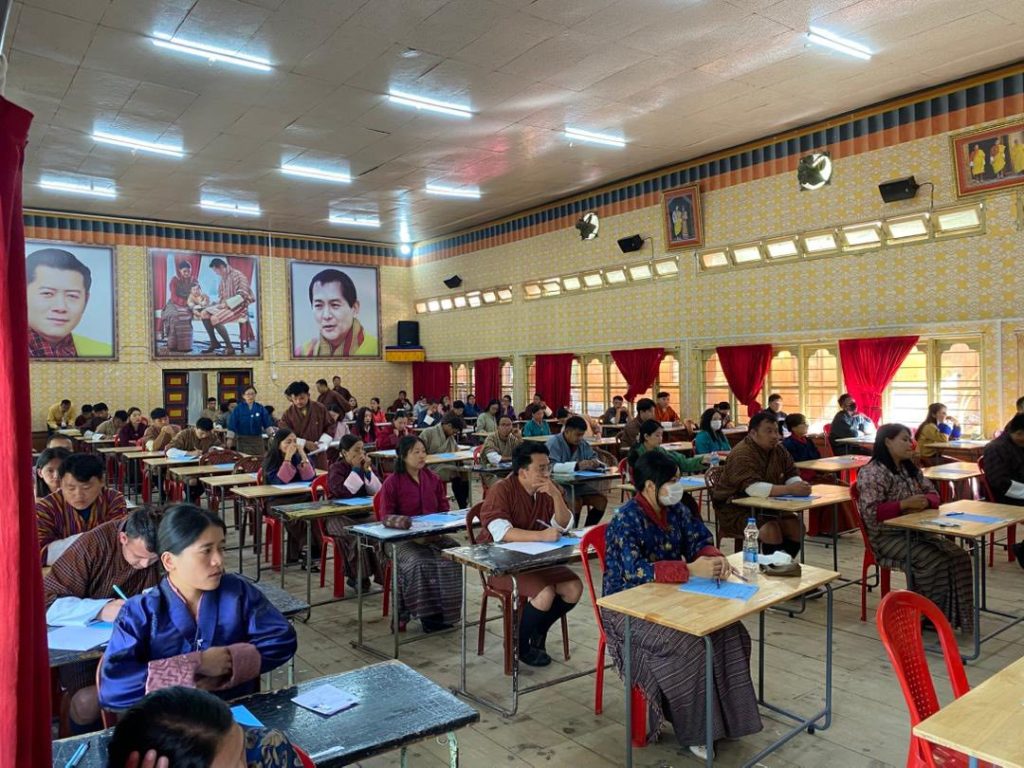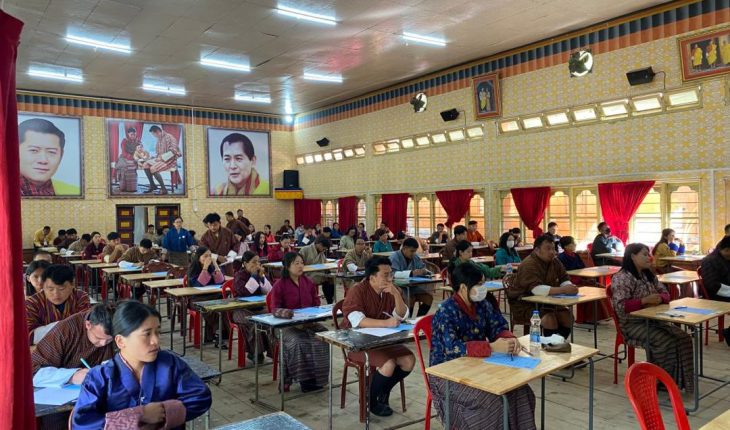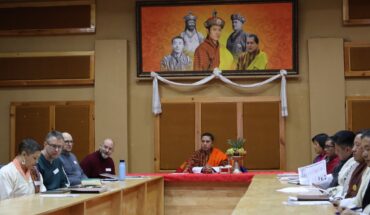
KINZANG DORJI TSHERING | Thimphu
The Bhutan Civil Service Examination (BCSE) 2025 has drawn strong reactions from graduates after the Royal Civil Service Commission (RCSC) introduced key changes this year, including a higher Preliminary Examination (PE) cut-off and exemptions for healthcare graduates.
Compared to 2024, this year’s examination has been described as tougher, more competitive, and more selective, with candidates expressing both appreciation for higher standards and frustration over communication gaps.
The most striking change was the increase in the PE passing mark from 50 percent to 55 percent, resulting in a noticeable decline in the overall pass rate from 65.48 percent last year to 49.02 percent in 2025. Candidates say the new cut-off pushed them to study more seriously but also added additional pressure.
“Yeshi Samdrup, a graduate from Sherubtse College, said the higher cut-off made him take his preparation more seriously. ‘When the cut-off increased to 55%, it definitely made me more serious about my preparation. I realized I couldn’t rely only on general understanding, so I spent more time practicing past papers and revising key topics. It added a bit more pressure, but in a positive way, it pushed me to be more disciplined and focused. Overall, I think it helped improve both my confidence and performance,’ he said.”
Sharing a similar experience, Sangay Choden, a graduate from Norbuling Rigter College, said the increased benchmark motivated her to approach her preparation differently. “When the cut- off was raised to 55%, it made me more cautious about how I studied. I had to go beyond just reading notes and really understand the concepts. It was stressful, but it forced me to be more consistent and better prepared,” she said.
Both graduates agreed that this year’s examination was more challenging than expected. The difficulty level, they said, was higher, and time management played a crucial role. “One of the biggest challenges is adjusting to the higher level of competition and question difficulty. The time limit felt tighter this year, and I found it harder to balance accuracy with speed,” said Yeshi Samdrup. He added that the new question design demanded more analytical thinking than memorization.
Sangay Choden also described this year’s paper as more analytical and demanding. “This year felt much tougher because the questions required deeper understanding. I noticed that I couldn’t rely on memorized facts — I had to think critically for almost every question,” she said. “The sudden changes in exam rules and updates also created confusion among many candidates.”
Another major topic of discussion among graduates was the RCSC’s decision to exempt healthcare graduates from the PE. While the RCSC stated that the change aimed to address urgent workforce needs in the health sector, some candidates questioned whether it was fair to others who had to go through the full process.
“I understand that healthcare professionals are urgently needed and that their fields are very specialized, but it did feel a bit unfair to the rest of us who had to compete through the PE,” said Yeshi Samdrup. “Maybe a different form of assessment or a separate evaluation could have been a more balanced approach.”
Sangay Choden shared a similar sentiment, saying the measure should have been implemented more equitably. “I understand the reason behind it, but honestly, it wasn’t entirely fair to other graduates. Everyone works hard to prepare for the PE, so having one group exempted felt unequal,” she said. “Maybe a different evaluation system could have been used to maintain fairness.”
Candidates also highlighted issues with communication and updates from the RCSC. While most agreed that information was generally available, they said that some important updates came late or lacked adequate detail. “The information was mostly clear, but there were moments when updates came a little late or weren’t fully detailed,” said Yeshi Samdrup. “That caused some confusion among candidates, especially about certain rule changes and document requirements.”
Sangay Choden said earlier notifications or online briefings could have eased the uncertainty. “Some updates came quite late, and a few clarifications were missing. If RCSC had organized short online briefings or issued earlier notifications, it would have helped a lot,” she said.
Despite the challenges, both graduates acknowledged the RCSC’s effort to strengthen merit- based selection. They appreciated the higher standards but urged the Commission to improve transparency and candidate support in future examinations. “I think RCSC could make the process more transparent by explaining marking criteria more clearly and giving timely updates on any changes,” said Yeshi Samdrup. “It would also be great if candidates could receive some feedback on their PE performance, so they know where to improve.”
Echoing that view, Sangay Choden suggested that short orientation sessions or mock tests before the examination could make the process less intimidating. “If RCSC could organize orientation sessions or provide feedback after the exam, it would make the system feel more transparent and supportive,” she said.
This year’s BCSE also reflected broader reforms within the RCSC, including strategic adjustments to service vacancies and the introduction of the RCSC Strategic Roadmap (2025–2035). Administration and finance service vacancies were increased, while technical service posts were reduced, reflecting a shift toward data-driven workforce planning. The new roadmap envisions transforming Bhutan’s bureaucracy into what the Commission describes as an “Enlightened Entrepreneurial Bureaucracy,” emphasizing leadership development, accountability, and innovation.
As the results of the main examination are awaited in December, graduates say they hope the RCSC continues to uphold high standards while also enhancing fairness and clarity in communication. For many, the 2025 BCSE marks a turning point — one that tested not only their knowledge but also their resilience and adaptability in an evolving civil service landscape.





